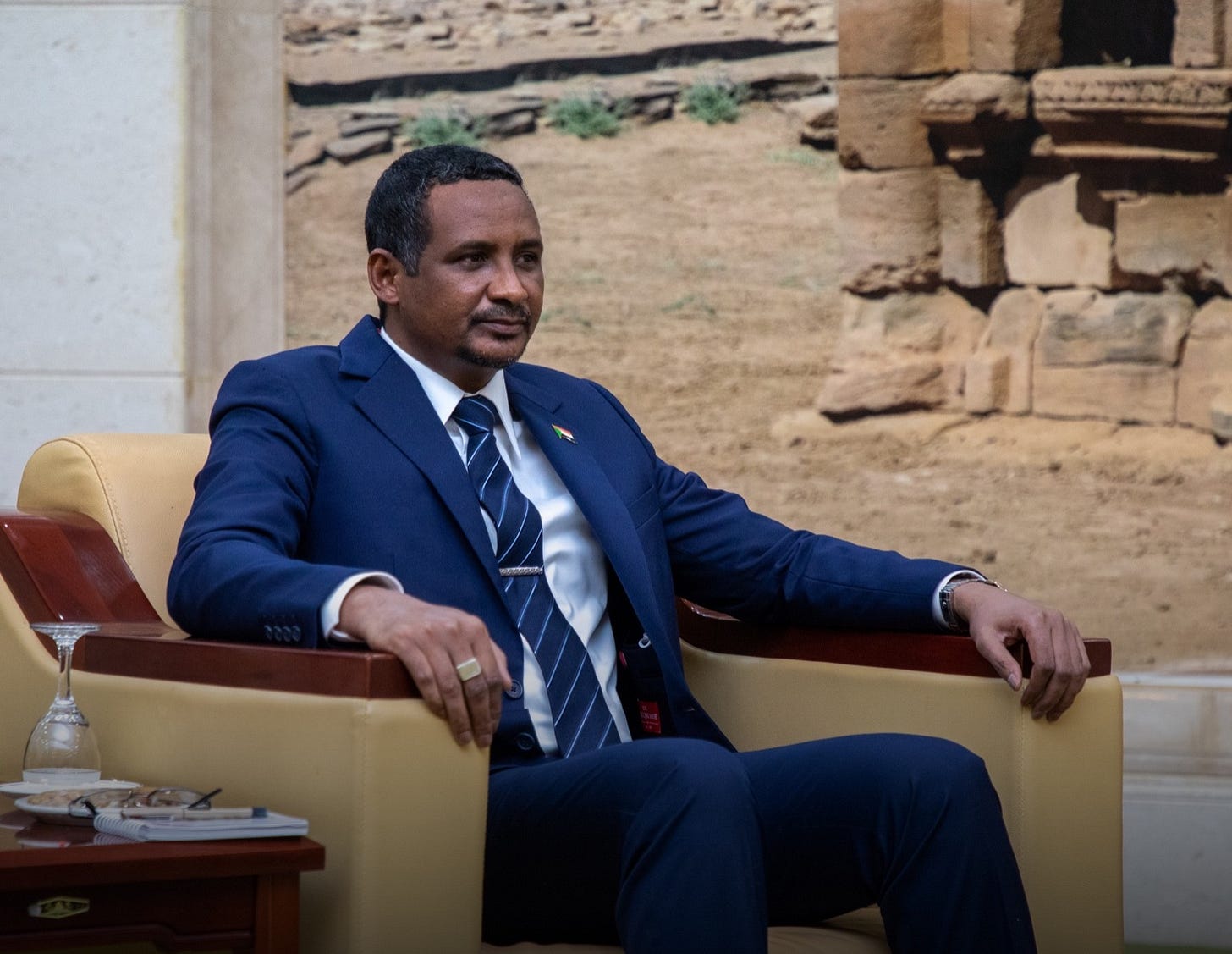10 questions for Mohamed Hamdan Dagalo
Hardball interview questions for the Rapid Support Forces leader
Social media platforms have democratized speech but they have also made politicians all over the world unaccountable to the traditional news media (TV, radio, newspapers), which were previously significant in shaping public opinion.
Influential politicians nowadays know that rather than answering tough questions from independent journalists, they can simply turn to social media to build up their own direct following and send out their message unfiltered.
This is especially true if they have money. Prior to the war, Sudan’s Rapid Support Forces (RSF) leader Mohamed Hamdan Dagalo (“Hemedti”) used his vast wealth to build up a large following on social media, using professional advisors, paid influencers, sleek propaganda videos, and bot networks to amplify his messages.
Yesterday evening, September 4, Hemedti issued a 20-minute audio message on Twitter and other social media platforms. Overnight, the recording already had a million views on Twitter, and that’s just from his official account—not counting unofficial RSF accounts that uploaded it, and RSF accounts on the other platforms.
Hemedti hasn’t given an interview since April, when he spoke by phone with several major Arabic TV outlets. This is unfortunate because in comparison to an unfiltered propaganda speech, the traditional question-and-answer format of an interview is very different. The journalist can frame the discussion, ask tough questions, interject if the interviewee goes off-topic, and ask follow-up questions.
Journalism used to matter, and I hope that it won’t die entirely. As a journalist myself, I can think of a few questions I’d like to ask Hemedti—though I don’t work for a major international news organization, nor do I speak Arabic fluently enough to interview Hemedti myself. But if I did, here is what I would ask him:
What recent contacts have you had to discuss ending the war? Or are you only interested in continuing the war?
Many of your supporters and troops call you ‘president,’ ‘commander-in-chief,’ or even ‘emir.’ What role do you envision for yourself after the war?
The President of the Sovereignty Council Abdel Fattah al-Burhan offered to step down if you would do likewise. How do you respond to this proposal?
No doubt you are aware of the rumors that you were wounded or even killed, and that is why you limited your public appearances. How is your health?
The human rights organization Emergency Lawyers recently reported that your forces are operating 44 detention centers in Khartoum State where they are illegally detaining citizens in cruel conditions. Would you allow independent monitors to access these sites to verify these allegations, as they requested?
What is the minimum age of service in the Rapid Support Forces? We have seen some videos of child soldiers in the ranks of your forces.
During a previous ceasefire, your troops carried out a major attack and captured an army base in Khartoum (al-Strategia). Given this violation, how can anyone have confidence that you will respect a future ceasefire or peace agreement?
Hundreds of your soldiers have been maimed and wounded in the past few months, and the toll could be in the thousands by the time the war ends. They will not necessarily qualify for disability benefits from the government after the war. What are you doing to care for them? How do you plan to provide for them?
Your forces surround the area in Omdurman where former Sudanese President Omar al-Bashir is said to have taken refuge. If your forces capture him, will you hand him over to the International Criminal Court (ICC)?
If you are indicted by the ICC yourself, will you turn yourself in?
I hope that major Arabic news outlets will continue to pressure Hemedti for an interview, and will ask him tough questions like these ones.
In brief
In other news…
General Abdel Fattah al-Burhan made an unannounced visit Tuesday to Juba where he was received by the South Sudanese leader Salva Kiir Mayardit. Coinciding with the visit, Sudan’s acting foreign minister released a statement saying South Sudan would be Sudan’s preferred choice of mediator in future talks.
The Rapid Support Forces yesterday claimed to have downed an Antonov aircraft, without specifying where this occurred.
Five civilians were killed by bombs that “fell on their homes” in Khartoum on Sunday, a Sudanese medical source told AFP. This is addition to the 20 civilians killed in an aerial attack on Saturday.
Clashes and shelling were reported in various areas of Khartoum State yesterday, including Ombada and Old Omdurman. Al-Arabiya reported that 25 civilians were killed in Ombada, without giving details.
Yesterday we published an updated map of the areas of control in Southwest Khartoum, where fighting has raged around Armored Corps for over two weeks.
Bashair University Hospital handled 374 gunshot cases in August, 108 cases of stabbing and assault, 250 cases of missiles and aerial bombings, and 463 cases of natural accidents and chronic diseases, according to the Southern Belt Emergency Room (an initiative of hospital volunteers).
The city of Kadugli in South Kordofan saw a “cautious calm” Monday following an attack by SPLM-N on Sunday, according to Radio Dabanga. The fighting took place at Jebel Hajar al-Mek northeast of the city and lasted several hours.


